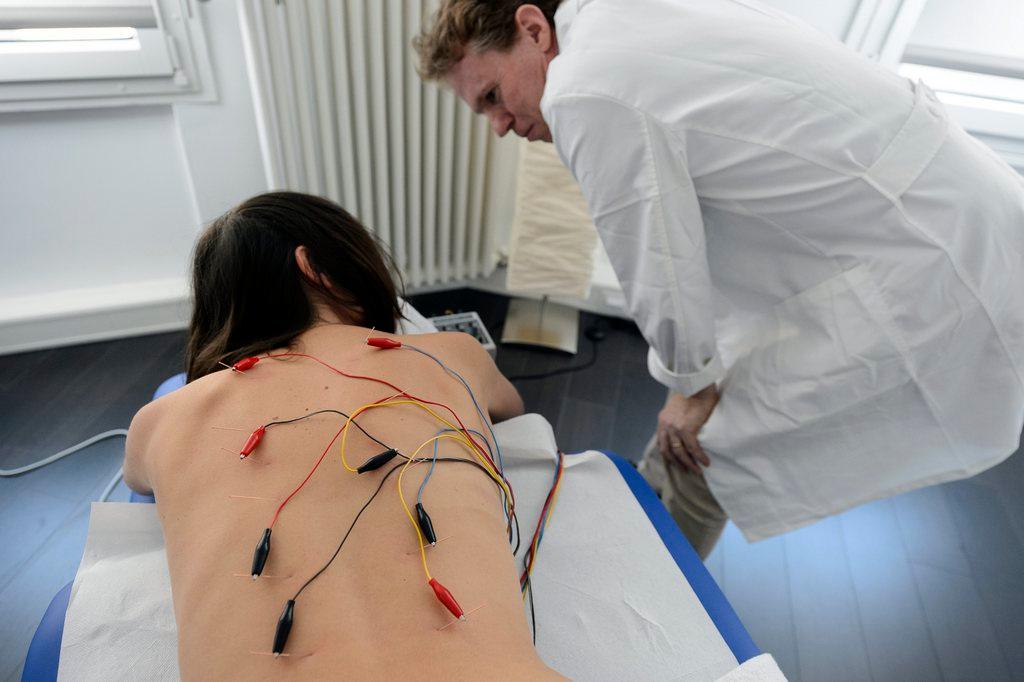Alternative medicine no longer an ‘outsider’ in Switzerland’s health system

Once on the margins of the healthcare system, growing public demand for complementary medicine has led to increased regulation in a bid to eliminate bad apples and improve patient safety. It’s the result of much trial and error.
Even before the coronavirus pandemic became an all-consuming topic, the government of the central Swiss canton of Lucerne was preoccupied with amending its health law. (Health matters fall under the purview of Switzerland’s 26 cantons which often means a lack of uniformity across the country).
In early March, a new draft of Lucerne’s health law was presented with one main objective: introduce work licences for alternative medicine practitioners in the fields of homeopathy, Ayurveda, Chinese Traditional Medicine and European Traditional Medicine.
“These practices pose a certain health risk for the population. With the introduction of the authorisation requirement, the canton Lucerne wants to ensure that only people who meet certain minimum professional skills are active,” Alexander Duss of canton Lucerne’s health department told swissinfo.ch.
But such requirements have been in place before and were then revoked. In 2006, Lucerne decided to do away with previous work licence requirements for alternative health practitioners. At the time there were too many different courses for the authorities to verify the qualifications of professionals, according to Hanspeter Vogler, head of canton Lucerne’s health department.
Ultimately, unable to guarantee uniform quality in the sector, the canton decided to leave it to patients to determine if their choice of a professional for treatment was the right one or not.

More
Why alternative therapies are covered by health insurance
Back into the mainstream
Everything changed in 2009 as a result of Switzerland’s direct democracy system. That year, two-thirds of Swiss citizens voted for the inclusion of alternative medicine on the constitutional list of services covered by health insurance. First integrated in 1999 they were struck off the list by the government in 2005 amid rising national health costs using the argument that they failed to meet the criteria of efficacy, cost-effectiveness and suitability.
As a result of the 2009 vote, five alternative therapies – homeopathy, holistic medicine, herbal medicine, acupuncture and traditional Chinese medicine – were included under the basic health insurance package (compulsory for all Swiss residents) on a trial basis provided they are administered by certified medical doctors. This move brought back alternative medicine into the fold of the mainstream healthcare. Authorities could no longer afford to ignore it now that it once again accounted for a share of national health costs.
So they set about developing standardised national-level examinations – for practitioners who were not doctors – that would lead to a federal diploma. Starting in 2015, naturopaths in the fields of homeopathy, Ayurveda, traditional Chinese medicine and traditional European medicine were able to obtain a diploma that was recognised throughout the country.
“It is always useful to have uniformity as health insurance companies are a bit slow when it comes to reimbursing treatments under the complementary medicine insurance package. They are also under pressure to cut costs,” says Franz Rutz, president of Swiss umbrella association of Ayurveda practitioners.
The introduction of the federal diploma also prompted many cantons – like Lucerne – to introduce or reintroduce work licences for naturopaths. To get one, naturopaths must submit their personal details and a copy of their federal diploma.
Opportunities and challenges
Official licensing means that those who get a federal diploma in naturopathy are exempt from paying value-added tax (VAT). They are also automatically included in the National Registry of Healthcare Professions and considered to be healthcare workers: a big leap from being on the fringes.
“With a cantonal work permit we are included in the primary healthcare system, for example now during the Covid-19 crisis we are allowed to continue working,” says Alexandra Nievergelt, co-president of the Swiss Professional Organization for Traditional Chinese Medicine, noting that naturopaths must also adhere to the same rules and restrictions as doctors amid coronavirus.

More
Ayurveda gets the nod from the Swiss government
She says that the work license has also helped allow alternative medicine practitioners to participate in health projects with other medical professionals, something that was not possible earlier.
On the other hand, changing to a cantonal license system raises questions about the fate of those who don’t have a federal diploma and are thus not eligible to obtain a license to practice.
“We welcome a cantonal work permit for the future as it helps to ensure that only qualified practitioners work in our field,” says Nievergelt. “Nonetheless we of course would like to assure that current practitioners are still able to continue working.”
Lucerne has proposed to allow a cushion of five years for practitioners to obtain their federal diploma but some are unhappy about sitting for exams even after acquiring decades of experience in their field. Disagreements over the exam have also led to offshoot groups among practitioners. For example, Ayurveda in Switzerland is now represented by four different associations and two schools because practitioners disagree about the way forward.
But it seems to be too late for those against licensing, as the tide has already turned in favour of standardisation and homegenisation of alternative medicine in Switzerland. Acupuncturists already need a licence in 20 of 26 Swiss cantons and Ayurveda therapists need one in 18 cantons (though most of the French-speaking cantons do not require them).
“It is about having clarity about the quality of practitioners. They should have the correct educational background, be able to make an accurate diagnosis and competent to administer health treatments,” says Rutz.
Five alternative therapies – homeopathy, holistic, herbal and neural therapies and traditional Chinese medicine – are included under the Swiss basic health insurance package. Cost of treatments are reimbursed under basic insurance only if administered by a medical doctor.
The cost of all other alternative and complementary therapies will only be reimbursed if the patient opts for a separate complementary health insurance package that costs extra. However, not all disciplines are recognised by insurers.
Two types of federal diplomas in alternative medicine are offered. The advanced one is that of a naturopath where diploma holders can diagnose ailments and prescribe treatments such as herbal preparations. Disciplines recognised include homeopathy, traditional Chinese medicine and traditional European medicine. Practitioners in possession of this naturopathy diploma can get a cantonal work licence.
The second category of federal diploma is that of a complementary therapist. Holders provide specialised treatments like oil massages to healthy people or those with small ailments but they are not allowed to diagnose a disease. Disciplines recognised by the government include yoga, shiatsu, craniosacral therapy and eutony.

In compliance with the JTI standards
More: SWI swissinfo.ch certified by the Journalism Trust Initiative











You can find an overview of ongoing debates with our journalists here . Please join us!
If you want to start a conversation about a topic raised in this article or want to report factual errors, email us at english@swissinfo.ch.